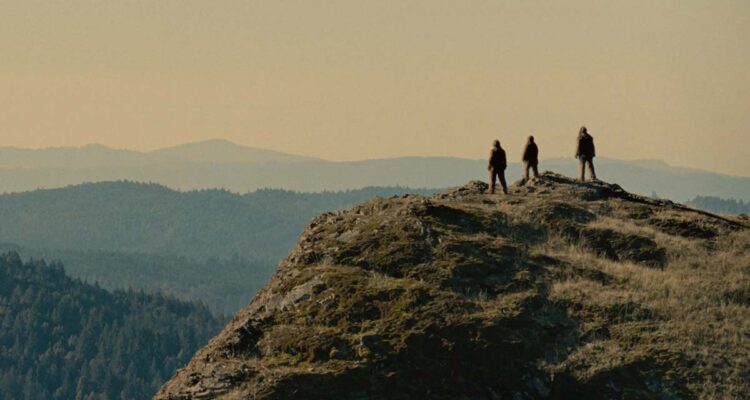There’s commitment to the bit, and then there’s David and Nathan Zellner. The brothers’ latest film “Sasquatch Sunset,” billed to Sundance audiences as only “a year in the life of a singular family,” makes good on the filmmaking duo’s long desire to make a film about the legend of Bigfoot. That logline deliberately undersells exactly what they made: a 90-minute, dialogue-free film that follows a family of sasquatches in the forest.
READ MORE: Sundance 2024: The 23 Most Anticipated Movies To Watch
Following an opening montage that establishes these proto-humans in silhouette, the Zellners cut to the gentle giants ponderously munching on some plants. There’s no longer any doubt: this is that kind of movie. And, bizarrely enough, it works. “Sasquatch Sunset” commands attention as it holds viewers in suspense if, for nothing else, how long they can sustain the concept.
The film proves simple yet slippery as it charts the seasons of life and cycles of nature through accumulating vignettes of sasquatch behavior. They fight and fornicate, pee and poop, pick their noses and pick their battles, eat and get eaten, get hard and go hard. Despite these primitive displays, they also develop rudimentary psychology and try to assert their dominance in the food chain.
“Sasquatch Sunset” can swing between adult drama or Adult Swim at any given moment. It’s thrilling to know that a scene can go in any direction. The Zellners inspire a posture of leaning into the events rather than just passive observation of these creatures as if behind glass at the zoo. Beneath the furious grunting and frantic gesticulation lies something deeply, darkly familiar. Under thick suits of hair and makeup, Jesse Eisenberg and Riley Keough have the daunting task of rendering humanistic performances through a most animalistic form.
It’s tough to make the actors out, though an occasional close-up will make their eyes unmistakable. Along with Christophe Zajac-Denek and Nathan Zellner, the actors subsume themselves into playing the sasquatches both physically and emotionally. The film asks them to go all-in on everything from boner gags to base cries for survival. “Sasquatch Sunset” lives and dies on their ability to convey the complexity of their circumstances with concision. For the immediate play-by-play, there’s scarcely a beat in doubt.
But what it all means, if anything, remains elusive throughout. That’s not a knock on the film; in fact, this overwhelming sense of mystery provides the tension lacking by presenting the family’s journey with such a straightforward, non-ironic gaze. “Sasquatch Sunset” feels like a great boundary-pushing work should: dangerous. It’s as if the bottom could fall out at any moment.
That disorientation is a deliberate choice from the filmmaking team. For much of the film, it’s ambiguous as to when exactly this is taking place. Is it a Kubrickian, “Dawn of Man” style presaging of our human ancestors? Are the homo sapiens lurking strategically out of frame? That lack of context forces viewers to take these characters on their own terms, judging them like the many members of the animal kingdom who appear as a running motif “Sasquatch Sunset.” Nature watches their antics with what’s best described as polite bemusement. Remarkably, these observations can feel ripped from Terrence Malick or an edgelord “Family Guy” cutaway gag depending on how the editing wants to position the shot.
Until the final shot, the Zellner Brothers leave unclear whether all of their oddball observations are building to a grand statement about humanity or a punchline. “Sasquatch Sunset” can accommodate readings of both. There’s a sensation of disbelief pervading the work, almost as if the directors cannot believe they are getting away with this. While this verve never manifests as smug self-satisfaction, their laser-like focus on achieving the ridiculous vision within this world makes it feel akin to a spell that dissipates soon after the credits roll.
Reading a political angle out of “Sasquatch Sunset” is possible, but doing so feels lower on the list of priorities compared to admiring the “Merry Prankster” quality of the Zellners’ absurdist vision. Their latest film makes for a natural extension of the Zellners’ fondness for unconventional protagonists, such as the ones in their earlier works like “Kid-Thing” and “Kumiko, The Treasure Hunter.” These figures, like the sasquatches, provide a window into the world that highlights its uncanniness. Here, the directors highlight the unfeeling, unruly nature of nature itself as creatures great and small attempt to find and feel their way through it. Apart from uncontrollable bodily exertions at the sight of something uncertain, what separates the viewer from the character here? [B]
Follow along for all our coverage of the 2024 Sundance Film Festival.

